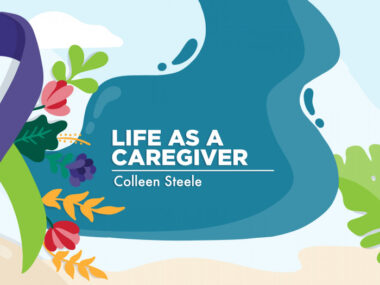Words of Support for Those Transitioning from Hope to Grief
Written by |

Pulmonary hypertension (PH) is an incurable, life-threatening disease. This reality is a gaping wound that patients and loved ones try to cover and protect with hope. But at some point, we are all forced to peek under the bandage.
What do we do when PH starts progressing, treatments stop helping, and difficult decisions need to be made?
When my son declined, we listed him for a heart and double-lung transplant. I have leaned on PHamily throughout his PH and post-transplant experiences and recommend that others do the same. Don’t be shy in accepting the love and support of those who understand the journey. But also don’t be stubborn and turn down help from outside the community. Allow family and friends to express their compassion by assisting in whatever way they can.
Christina Doak shares her thoughts about the value of self-care: “You cannot make good decisions with a huge lack of sleep.” Christina’s daughter, Katy, battled through PH, a double-lung transplant, and cancer. Throughout those difficult times, Christina accepted help from others by allowing them to stay with her child while she took time to eat and sleep.
She says it’s important to be kind to doctors and nurses, but adds that loved ones shouldn’t hesitate to ask as many questions as they need to.
Most of all, Christina adds, “Never give up hope until you know it’s the end.” She says that Katy was able to rally at least three times when doctors thought she wouldn’t make it. But when her daughter faced serious complications after a bone marrow transplant, Christina knew the end had arrived.
For parents whose kids are struggling, Becky Anderson’s advice is pure and simple: “Just love them.” Her daughter, Isabella, had PH and passed away six months after receiving a heart and double-lung transplant. She emphasizes how important it was to be her daughter’s voice and advocate through all of it. “Make sure your child knows you are there fighting for them,” Becky says. “Trust your gut; no one knows your child like you do.”
Julie Keeton encourages congenital heart and pulmonary hypertension families to get involved with the Pediatric Advanced Care Team at their hospital. Their PACT team was instrumental in giving her son Weston the best quality of life possible. The physical and emotional support that they provide is not just for hospice, but also for any stage of illness.
Christina, Becky, Julie, and two other PH transplant moms, Kathy Groebner and Rhonda Williams, experienced the pain of hope being ripped away, leaving them forever exposed to grief. I recently shared their heartache in a two-part series.
Julie offers the following advice to newly bereaved parents: “Focus on what your child loved and honor that.” Her son had a great appreciation for firefighters. Every year on his death anniversary, her family feeds the crew at their local fire department and encourages others to do the same. “It’s a fun way to celebrate Weston and the people he loved.”
Birthdays are gut-wrenching. Julie, her husband, and Weston’s siblings get through it by selecting and enjoying a cake, ice cream, and dinner that he would have liked. It’s a distraction that helps to keep them from sitting at home and crying all day.
Becky offers her deepest sympathy and love to parents who have lost a child. She understands what it’s like to be a part of a group that no one wants to join. “The next few months you will feel like you can’t breathe,” she says. Her advice is to take time for yourself to grieve and go through the emotions.
“Allow yourself to hurt — be sad, mad, whatever it is, feel it. It’s OK,” she says. How you do that is up to you. “Go to therapy, journal, take walks, or sit in a room and cry.” For Becky, taking the steps she needed to process her emotions helped her to start the healing process.
Every year on Isabella’s birthday, Becky looks forward to organizing a toy drive in her daughter’s memory. “It’s the perfect way to celebrate her life.”
Christina’s wish for grieving parents is that you go easy on yourself. “You did everything you could to help your child,” she says.
Allowing themselves to talk about Katy every day has helped the Doak family, especially Katy’s younger sister, Emily. A counselor explained to Christina that her daughter would process her grief differently as her brain continued to develop: “As she ages, she will be able to process the loss from a different vantage of thinking and experience.”
“Be good to your spouse as well,” Christina says. “He or she may be grieving differently than you, and that is OK, and should be accepted.”
Finally, remember that you are not alone. Kathy started the Facebook group “At one with an ANGEL” when her daughter Katie Grace passed away. It is a place for grieving parents to find understanding and support.
***
Note: Pulmonary Hypertension News is strictly a news and information website about the disease. It does not provide medical advice, diagnosis, or treatment. This content is not intended to be a substitute for professional medical advice, diagnosis, or treatment. Always seek the advice of your physician or other qualified health provider with any questions you may have regarding a medical condition. Never disregard professional medical advice or delay in seeking it because of something you have read on this website. The opinions expressed in this column are not those of Pulmonary Hypertension News or its parent company, Bionews Services, and are intended to spark discussion about issues pertaining to pulmonary hypertension.




Leave a comment
Fill in the required fields to post. Your email address will not be published.